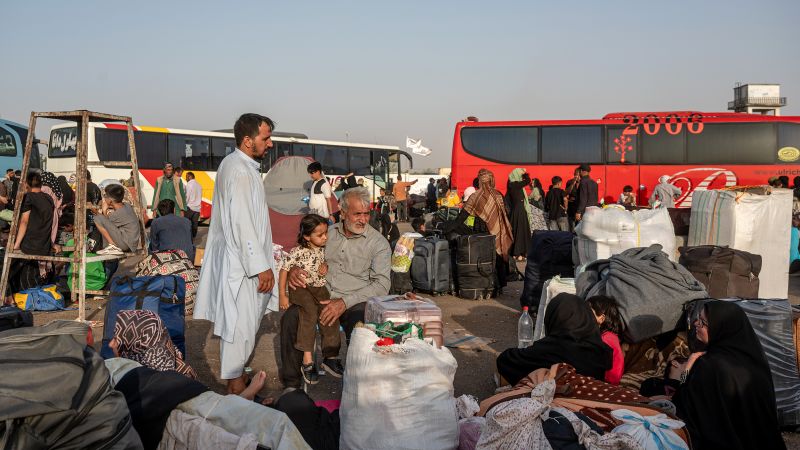
More than 508,000 Afghans have been expelled from Iran in a rapid 16-day period following the recent conflict with Israel, according to the United Nations. This significant forced movement of people may be one of the largest seen this decade. Since the conflict, Tehran has accelerated its long-standing policy of removing undocumented Afghan migrants, many of whom work in low-wage jobs under challenging conditions.
The International Organisation for Migration (IOM) reported that between June 24 and July 9, an alarming number of Afghans, specifically 508,426, crossed back into Afghanistan via the Iranian-Afghanistan border. On July 5 alone, 33,956 individuals made the crossing, following 30,635 on the previous day, and a peak of 51,000 on July 1. This surge in deportations is part of a program Iran announced in March, but has intensified rapidly since the outbreak of violence in the region.
The Iranian government has justified the expulsions with unverified claims that Afghan migrants engaged in espionage for Israel during the conflict. Critics argue that these allegations lack substantial evidence and suggest that the Iranian authorities are using the situation to target a vulnerable demographic while diverting attention from internal issues.
Conditions for those returning to Afghanistan are dire, particularly with summer temperatures soaring to 40 degrees Celsius (104 degrees Fahrenheit). Reception centers at the border are overwhelmed, struggling to accommodate the influx of returnees. Mihyung Park, chief of mission for the IOM, described the situation as “quite dire,” noting that thousands of people are waiting in harsh conditions. “Last week was quite massive,” Park stated, highlighting that half of the year’s returnees had arrived since June 1, with around 250,000 returning in just one week of July.
Footage from the border crossing at Islam Qala shows hundreds of migrants enduring long waits for processing and transport, often under the scorching sun. Many of these individuals have lived in Iran for years, and the sudden expulsion has left them in precarious situations.
Bashir, a young Afghan who was recently deported, recounted his experience of being detained in Tehran. He stated, “First, they took 10 million tomans (approximately $200) from me. Then they sent me to a detention center where I was kept for two nights and forced to pay another 2 million tomans (around $50). In the detention center, they wouldn’t give us food or drinking water.”
The plight of children has also come to light, with reports of unaccompanied minors among the returnees. Parisa, an 11-year-old girl, expressed her distress about being unable to attend school again. “We spent six years in Iran before they told us to apply for the exit letter and leave Iran,” she said, highlighting the additional challenges faced by families amidst the Taliban’s restrictions on education for girls.
The international community has condemned the abrupt rise in deportations and the accusations of espionage against Afghan migrants. Richard Bennett, the UN’s special rapporteur on Afghanistan, shared on social media that “hundreds of Afghans and members of ethnic and religious minorities detained in Iran are accused of espionage.” He also noted reports of incitement to discrimination and violence against these communities in Iranian media.
On July 1, Iranian government spokesperson Fatemeh Mohajerani stated, “We’ve always striven to be good hosts, but national security is a priority, and naturally illegal nationals must return.” This stance has been echoed by Iranian state media, which has aired footage of alleged Afghan spies confessing to working for Israeli interests, although no credible evidence has been provided to substantiate these claims.
As the Iranian government continues to enforce its deportation policy, the treatment of Afghans remains a focal point for humanitarian concerns. The situation on the ground is evolving, and the human impact of these policies could have lasting effects on both Iran and Afghanistan in the months to come.







